
New Brunswick, N.J., August 25, 2021 – Researchers from Rutgers Cancer Institute of New Jersey, the state’s only National Cancer Institute-designated Comprehensive Cancer Center, recently discovered a mechanism to explain what drives the formation of mucinous colorectal adenocarcinoma (MAC), a rare subtype of colorectal cancer (CRC), and has also identified the genes responsible for the regulation of this mechanism. The OnlineFirst version of this work was published August 20 in Cancer Research (DOI: 10.1158/0008-5472.CAN-21-0897).
According to the American Cancer Society, colorectal cancer (CRC) is the third leading cause of cancer-related death in men and women in the United States. MAC is a distinct and aggressive form of CRC, accounting for 10 to 15 percent of patients (Nat Rev Clin Oncol, June 2016). It is characterized by the excess secretion of the protein known as mucin and has an entirely different molecular signature – or biological behavior – than classic CRC. What drives the formation of MAC tumors is currently unknown and underexplored.
Using mouse models, investigators in this study demonstrated that loss of a tumor suppressor protein known as FILIP1L induces colonic epithelial hyperplasia and mucin secretion. They also demonstrated that FILIP1L stimulates degradation of a molecular chaperone protein known as PFDN1. This breakdown results in abnormal stabilization of PFDN1 leading to elevated mucin secretion and defects in cell division in colon cancer cells. These defects mirror the same characteristics that are seen in the aggressive form of MAC. The authors note these findings strongly implicate FILIP1L as an essential regulator of MAC tumor development.
“Decreased production of FILIP1L is associated with chemotherapy resistance and poor prognosis in ovarian and colon cancers. Elucidating the driver behind the development of mucinous colorectal adenocarcinoma gives researchers the ability to explore ways to target this mechanism and develop much needed therapeutics for this particular patient population,” says the study’s lead author Mijung Kwon, PhD, Rutgers Cancer Institute researcher and assistant professor of medicine at Rutgers Robert Wood Johnson Medical School.
“Our lab already has published evidence (PMID: 18794120, 21693594, 24327474, 24340050, 25200207 and 27776341) that FILIP1L plays a role in other cancer types such as pancreas, lung, breast, ovarian and prostate. Identifying an association between FILIP1L and mucinous colorectal adenocarcinoma further enhances our understanding of the role this novel tumor suppressor plays in the development of these cancers,” notes Rutgers Cancer Institute of New Jersey Director Steven K. Libutti, MD, FACS, who is also senior vice president of oncology services at RWJBarnabas Health, vice chancellor for cancer programs for Rutgers Biomedical and Health Sciences, and senior author of the work.
The authors are continuing to explore this mechanism in both human tumor samples and in evolving mouse models in the hope that their work can lead to novel treatment and diagnostic approaches.
This work was supported in part by the Office of the Assistant Secretary of Defense for Health Affairs through the Ovarian Cancer Research Program under Award No. W81XWH-15-1-0369 (Kwon and S. Libutti). Opinions, interpretations, conclusions and recommendations are those of the authors and are not necessarily endorsed by the Department of Defense. This work was also supported in part by NCI Cancer Center Support Grant P30CA072720 (S. Libutti) through the use of Shared Resource Facilities.
Along with Drs. Kwon and Libutti, other authors on the study are: Genesaret Rubio, Nicholas Nolan, Peter Auteri, Jean Arly Volmar and Asha Adem, Rutgers Cancer Institute of New Jersey; Parisa Javidian and Zhongren Zhou, Rutgers Robert Wood Johnson Medical School; Michael P. Verzi, Rutgers University; and Sharon R. Pine, Rutgers Cancer Institute of New Jersey and Rutgers Robert Wood Johnson Medical School.
About Rutgers Cancer Institute of New Jersey
As New Jersey’s only National Cancer Institute-designated Comprehensive Cancer Center, Rutgers Cancer Institute, together with RWJBarnabas Health, offers the most advanced cancer treatment options including bone marrow transplantation, proton therapy, CAR T-cell therapy and complex surgical procedures. Along with clinical trials and novel therapeutics such as precision medicine and immunotherapy – many of which are not widely available – patients have access to these cutting-edge therapies at Rutgers Cancer Institute of New Jersey in New Brunswick, Rutgers Cancer Institute of New Jersey at University Hospital in Newark, as well as through RWJBarnabas Health facilities. To make a tax-deductible gift to support the Nursing Excellence at Rutgers Cancer Institute of New Jersey Fund, call 848-932-8013 or visit www.cinj.org/giving.
###
For journalists – contact:
Krista Didzbalis
Media Relations Assistant
732-507-8307
krista.didzbalis@rutgers.edu
For patient appointments/inquiries – contact:
844-CANCERNJ (844-226-2376)

